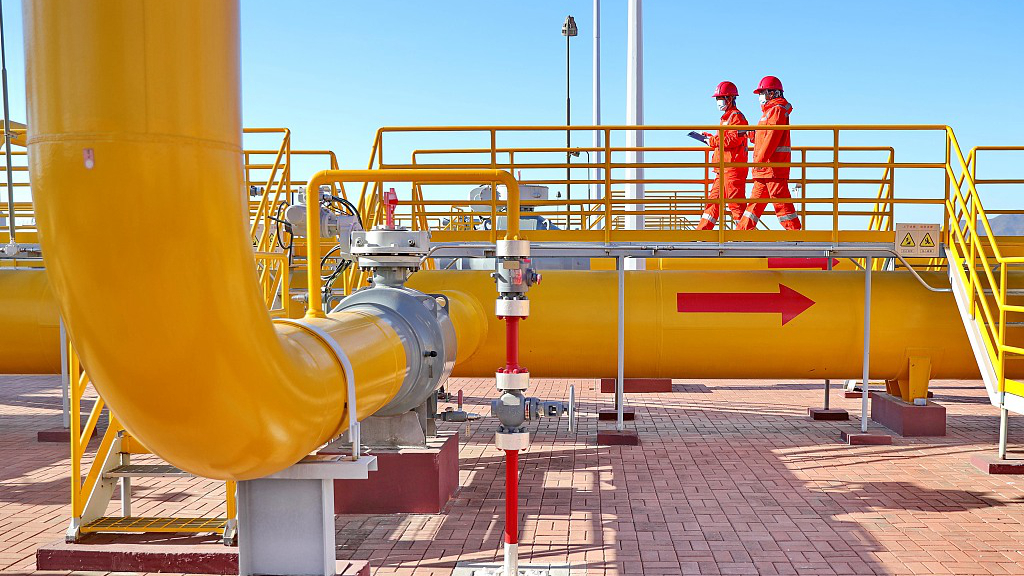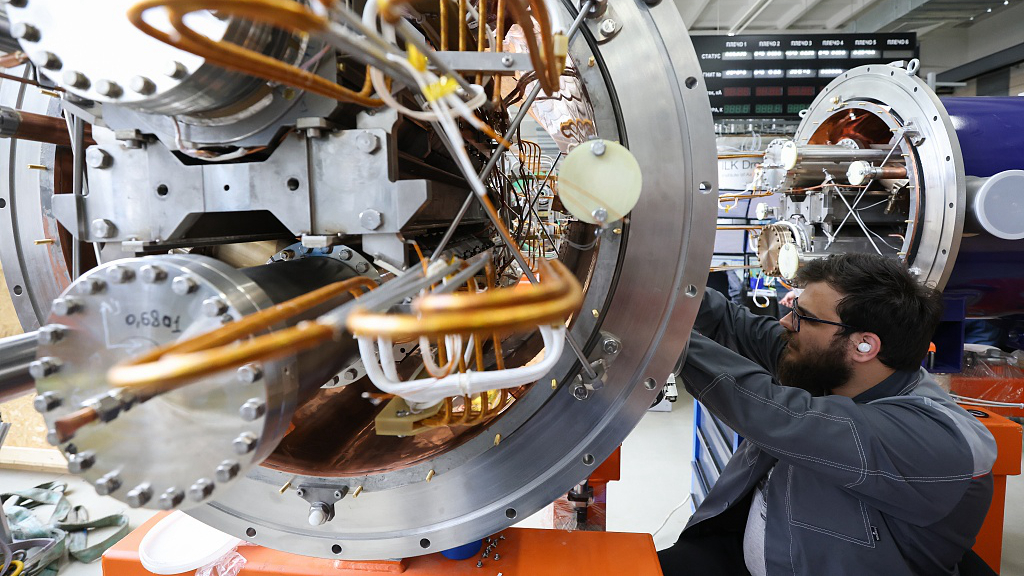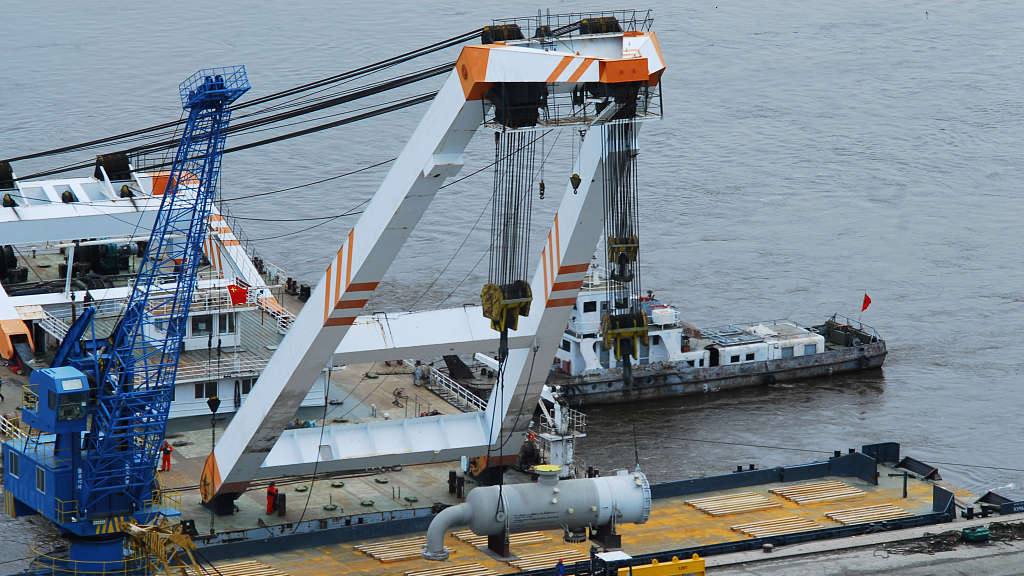
Staff conduct daily inspections of a section of China-Russia eastern route natural gas pipeline in Qinhuangdao, north China's Hebei Province, November 1, 2022. /CFP
Staff conduct daily inspections of a section of China-Russia eastern route natural gas pipeline in Qinhuangdao, north China's Hebei Province, November 1, 2022. /CFP
China-Russia comprehensive strategic partnership of coordination for a new era has boosted sci-tech and innovation cooperation between the two countries.
"Our cooperation on major projects in such fields as energy, aviation, space and connectivity is moving forward steadily. Our collaboration in scientific and technological innovation, cross-border e-commerce and other emerging areas is showing a strong momentum," Chinese President Xi Jinping wrote in a signed article published Monday ahead of his state visit to Russia.
China-Russian Federation sci-tech cooperation can be traced back to 1992, according to the Russia-China Dialogue: The 2020 Model, an annual report on the development of bilateral cooperation by leading international affairs experts from both countries.
Encouraged by preferential policies in recent years, China and Russia have seen a rapid expansion in sci-tech and innovation cooperation.
High sci-tech complementarity
China and Russia are highly complementary in the field of science and technology, according to Li Ziguo, director of the Department for European-Central Asian Studies, China Institute of International Studies.
China is relatively weak in basic scientific research but strong in application technology and enjoys a vast market, while Russia possesses strength in basic research but its conversion rate of scientific research achievements is low and its market capacity is small, he explained.
In 2019, China and Russia designated 2020 and 2021 as the China-Russia Year of Scientific and Technological Innovation.
In 2020, the two countries signed the road map of cooperation in the fields of science, technology and innovation for the 2020-2025 period. The road map, which is seen as the most important interim result of bilateral tech cooperation, systematizes the positive results of bilateral cooperation and identifies the main areas of future cooperation.
During the Year of Scientific and Technological Innovation, China and Russia joined hands to overcome the impact of COVID-19 and carried out more than 1,000 scientific and technological innovation activities.
Main interaction areas
The most promising areas of bilateral interaction in science and technology involve information technology, the Russia-China Dialogue: The 2021 Model report said.
With COVID-19 accelerating digital transformation, China and Russia have held multiple forums on cooperation in the digital economy.
On the city level, Beijing and Moscow have signed an investment cooperation agreement, according to which the Moscow Innovation Cluster and the Zhongguancun Science and Technology Park will carry out joint R&D and innovation work in advanced science and technology.
On the corporate level, Chinese company Huawei has signed a cooperative agreement with VisionLabs on the creation of a joint IT product for a smart city system. Other cooperation projects in the field of digital economy have also been rolled out between Chinese firms, such as Alibaba Group and Xiaomi, and Russian companies, including Mail.ru Group, MegaFon and MTS.
China and Russia have made real and productive interactions in physics and astronomy.
A number of Chinese scientific centers have worked with Russia's Joint Institute for Nuclear Research on mega-science projects, such as the construction and operation of the Nuclotron-based Ion Collider facility (NICA), a particles accelerator complex.

A worker assembles a lens module on the NICA at the Joint Institute for Nuclear Research in the town of Dubna in Moscow Region, Russia, April 13, 2022. /CFP
A worker assembles a lens module on the NICA at the Joint Institute for Nuclear Research in the town of Dubna in Moscow Region, Russia, April 13, 2022. /CFP
In 2021, China and Russia revealed their road map for a future international lunar research station, with a plan to give all interested countries and international partners access to the station.
Both sides have also made progress in areas such as remote sensing, exploration of the moon and outer space, electronic components for space flight applications, and the monitoring of space debris.
In terms of energy cooperation, the construction of the seventh and eighth power units of the Tianwan Nuclear Power Plant and the third and fourth power units of the Xudabao Nuclear Power Plant in China were launched in May 2021.
The under-construction China-Russia eastern route natural gas pipeline is expected to complete in 2025, with a total length of 5,111 km. Upon its completion, the cross-border pipeline will run through nine provincial-level regions and supply natural gas to areas along the route, including Beijing, Shanghai and Tianjin.

A 500-tonne lifting and floating crane is operated in the Heihe Port in northeastern China to aid Sino-Russian energy cooperation projects, May 27, 2019. /CFP
A 500-tonne lifting and floating crane is operated in the Heihe Port in northeastern China to aid Sino-Russian energy cooperation projects, May 27, 2019. /CFP
Moreover, the launches of the Russia-China Investment Fund and the China-Russia Science and Technology Innovation Fund have provided new channels for project financing for new technologies in key economic and cross-cutting fields in both countries.
Xi's visit will open a new stage of Russia-China cooperation in the fields of economy, science and technology, and people-to-people and cultural exchanges, said Yuri Tavrovsky, a professor of the Russian University of Peoples' Friendship.
(Cover via CFP)